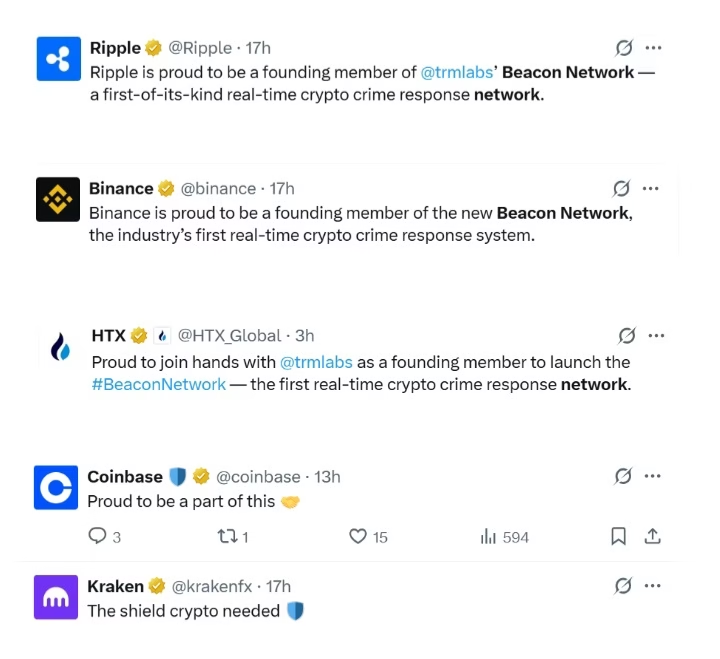TRM Labs has unveiled the Beacon Network, a global platform designed to help crypto exchanges, law enforcement, and security researchers collaborate in real time against illicit financial activity. Launched on August 21, 2025, the initiative represents a landmark step in the industry’s ongoing battle against fraud, hacks, and money laundering.
For years, stolen or illicit digital assets could slip through the blockchain ecosystem within minutes, leaving platforms and regulators scrambling to trace their movements. The Beacon Network seeks to change that by enabling verified participants to flag suspicious wallet addresses instantly, preventing criminals from cashing out stolen funds.

“Crypto crime is borderless and fast-moving. The Beacon Network gives us a way to respond with the same speed and scale,” — Esteban Castaño, CEO of TRM Labs.
Industry heavyweights back the initiative
The Beacon Network is supported by some of the world’s most prominent exchanges and payment platforms, including Coinbase, Binance, Ripple, Kraken, PayPal, Robinhood, Stripe, and Crypto.com. Other major firms such as Blockchain.com, Anchorage Digital, Bitfinex, and OKX have also joined.
This broad coalition signals growing recognition that crypto businesses cannot fight illicit activity alone. Federal law enforcement agencies are partnering with the network to identify and flag addresses linked to cybercrime. Security experts and independent watchdogs — including ZachXBT, Security Alliance (SEAL), Hypernative, and CryptoForensics Investigators — will also contribute to monitoring and analysis.
“The Beacon Network represents one of the strongest examples yet of public-private partnership in the digital asset space,” — Angela Bryant, policy advisor at the U.S. Department of Justice’s Cybercrime Unit.
Billions at stake in escalating crypto crime
The urgency of the Beacon Network is underscored by staggering losses. Since 2023, at least $47 billion in digital assets has been funneled to fraud-related addresses, according to TRM Labs data. In 2025 alone, cyberattacks have drained more than $2.3 billion from investors and exchanges, making it one of the most damaging years on record.
The true scale may be higher, as many victims remain silent due to embarrassment or lack of legal recourse. High-profile breaches, such as the $1.5 billion Bybit hack earlier this year, demonstrated how quickly stolen funds can be split across thousands of transactions to evade tracking.
The Beacon Network aims to shift the industry’s posture from reaction to prevention. Its system provides:
- Real-time alerts for suspicious fund movements.
- Address flagging by vetted participants.
- Rapid response protocols for flagged transactions.
- Global coordination to prevent cash-outs through exchanges and fiat gateways.
- Toward legitimacy and investor confidence
The launch of the Beacon Network is also part of a broader push to mainstream and regulate the cryptocurrency industry, which continues to face scrutiny from policymakers. By bringing together exchanges, payment firms, and regulators, the network offers a proactive model for addressing the sector’s most persistent criticism: its vulnerability to crime.
Industry observers argue that greater transparency and accountability could help restore investor confidence after a turbulent two years of hacks, bankruptcies, and fraud scandals.
“This is not just about stopping criminals. It’s about proving that the digital asset ecosystem can police itself and protect investors,” — Maya Thompson, senior analyst at Chainalysis.
For investors, the presence of a coordinated defense mechanism could signal a safer environment for participation in digital markets. For policymakers, the Beacon Network provides evidence that self-regulation and collaboration can complement formal oversight, potentially reducing pressure for heavy-handed restrictions.
A test for global adoption
The success of the Beacon Network will depend on adoption beyond its initial members. Smaller exchanges, regional regulators, and emerging blockchain platforms will need to integrate for the system to be truly comprehensive. Questions also remain about how disputes over flagged addresses will be resolved, and whether criminals will quickly adapt with new laundering tactics.
Still, the initiative is widely regarded as a milestone in crypto security. If successful, it could become a blueprint for how decentralized and centralized stakeholders work together to mitigate systemic risks.
For now, the Beacon Network marks a shift in how the industry approaches crime: not as isolated incidents to chase after, but as threats that can be intercepted before they spread.


Leave a Reply